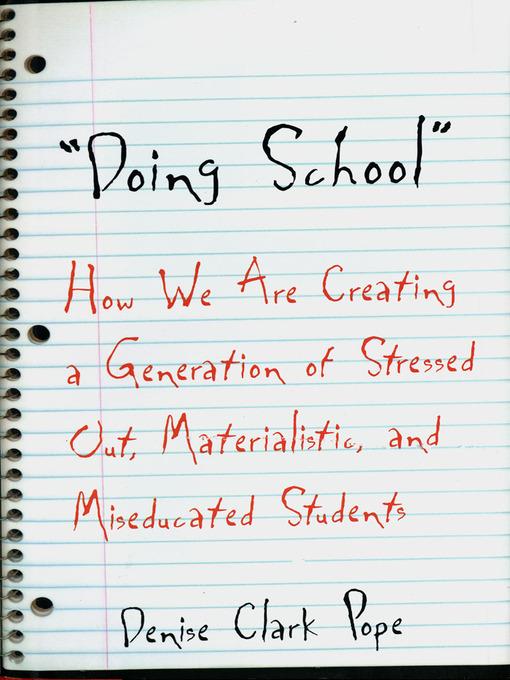
Doing School
How We Are Creating a Generation of Stressed-Out, Materialistic, and Miseducated Students
کتاب های مرتبط
- اطلاعات
- نقد و بررسی
- دیدگاه کاربران
نقد و بررسی

September 24, 2001
By and large, the recent focus on American education has been on the shortcomings of our worst schools. Pope, a lecturer at the Stanford University School of Education, zeroes in on a well-regarded California public high school and explores "the educational experience" from the students' points of view. Her year-long shadowing of five intelligent, motivated students from diverse backgrounds raises the troubling proposition that even our best schools may be misserving our best students, and reveals the ambiguous nature of our successes. Devoting a detailed chapter to the school lives of each student, Pope asks two important questions: "What exactly is being learned in high schools like Faircrest? And at what costs?" The answers are dismaying. Students learn that getting A's is of supreme importance, and that it is sometimes more advantageous to be "system savvy" than it is to actually learn the material. Still, Pope's five subjects work hard at grueling routines, sacrificing sleep and social lives to the desire to succeed. The costs of their achievements, she suggests, are "severe anxiety or breakdowns," "persistent health or sleep problems" and ethical compromise in the conflict between these students' ideals and values and the grade-grubbing, self-serving alliances with adult advocates and (usually subtle) cheating they deem necessary to success. A scholarly study presented with great clarity and enlivened by vignettes of student life, this work provides a fresh perspective on the state of American education, and yet another reason to press for systematic reform.

November 1, 2002
In this important and timely study, Pope, a veteran teacher, curriculum expert, and lecturer at the Stanford University School of Education, offers a revealing look at the quandaries of today's high school students. The book is based on Pope's yearlong research, which consisted of shadowing and interviewing five successful students of diverse ethnic and socioeconomic backgrounds at a highly regarded California public high school. Pope adroitly takes the students' point of view and finds that they are frustrated by being caught in a "grade trap"; often stressed out, exhausted, and anxious, they are resentful that their future success is dependent on their GPA and test scores. These and similar findings raise critical questions for concerned parents, educators, and policy makers involved in all levels of education, making this an essential purchase for high school, college, and university libraries and one strongly recommended for public libraries where interest in education is strong.-Samuel T. Huang, Univ. of Arizona, Tucson
Copyright 2002 Library Journal, LLC Used with permission.

October 15, 2001
For this eye-opening look at the underpinnings of public education, Pope tracked five top California students through the halls and in their classrooms during eight months at a highly competitive high school. Her conclusions, based on her observations and candid revelations from the kids themselves, are certainly disconcerting, if not entirely unexpected: public education today rewards achievement not learning, a distinction both Pope and the kids she spoke with make very clear. Instead of producing kids excited about knowledge for its own sake, many of today's top schools are turning out anxious, stressed-out students too invested in grades and test scores to care about what they learn or how they learn it. Classroom chameleons, Pope calls them: good kids, recognized by teachers as among the best, who find the pressure so great they will lie, cheat, and manipulate to get ahead. A disheartening picture of a society in which test scores and grades are increasingly accepted as the barometer for educational, and personal, success.(Reprinted with permission of Booklist, copyright 2001, American Library Association.)

























دیدگاه کاربران